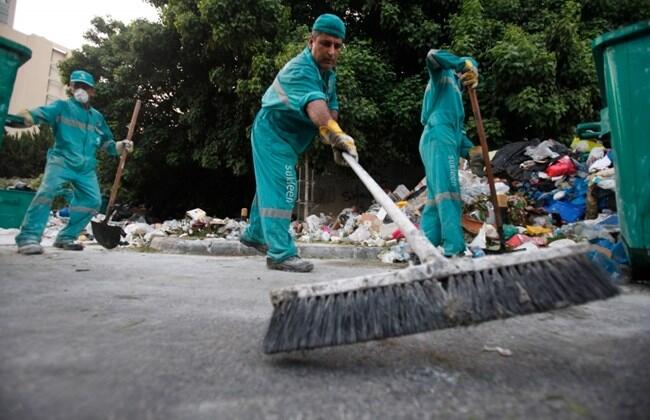Mount Lebanon residents blocked access to some of the region’s quarries Wednesday evening after news emerged that a ministerial committee was looking at dumping the waste on top of one of the country’s richest aquifers. The committee, headed by Prime Minister Tammam Salam, adjourned without agreeing on a lasting solution to capital region’s trash crisis. The National News Agency reported late Wednesday that garbage trucks unloaded trash in the Beirut area of Karantina amid strict security measures. “There are several areas on the table for consideration, and we would distribute the waste among some of them. Hopefully, [the committee] can agree on something in the next two days,” said Nabil al-Jisr, the head of the Council for Development and Reconstruction, who attended the meeting. The committee, headed by premier Tammam Salam and comprised of eight ministers from various political parties, will meet again Thursday. News sources reported that the committee considered opening dumps in Ain Dara and Daher al-Baidar in Mount Lebanon, andSibline near Jiyyeh. Jisr told The Daily Star this information was incorrect, but would not say what locations the committee considered. A scientist at the Environment Ministry said dumping in Mount Lebanon would amount to an ecological disaster. “You cannot imagine the amount of damage you will cause if you take the waste up to 1,300 feet,” the scientist said, asking for anonymity. “I prefer to dump in the sea than in Ain Dara, where [the pollution] would contaminate the country’s biggest underground lake.” The mayor of Ain Dara vowed to block any attempts to bring waste to the spent quarries nearby. “There is no possibility of a landfill in Ain Dara because we are at the peak of the mountains, and this is an aquifer,” Sami Haddad said at a news conference before the demonstration, which he attended. Environment Minister Mohammad Machnouk announced Monday evening that the ad hoc ministerial committee had resolve the trash crisis, but general disorder Wednesday suggested otherwise. Mounds of waste polluted the capital for the 10th consecutive day, and obscure efforts to remove the garbage created as many problems as they solved. At the Beirut port, one of the country’s largest flour mills, Bakalian, halted its plant Wednesday after trucks dumped garbage nearby, threatening to contaminate food production. And Public Works Minister Ghazi Zeaiter warned that dumping trash near the capital’s airport threatened flight safety. He said birds attracted to the trash could get sucked into jet engines, jeopardizing take-offs and landings. Sukleen workers were seen directing heavy machinery to dump processed bales of waste at an open, dirt lot by the airport, near Costa Brava beach, in Khaldeh. Videos and images have surfaced all week on social media exposing environmentally unsound, makeshift dumps. Activists with the “You Reek” environmentalist group filmed trucks pouring garbage in a lot they said sat on the banks of the Beirut River, in Sin al-Fil. Other clips broadcast on TV showed trucks dumping in several of Mount Lebanon’s green valleys, including Monte Verde. “You Reek” activists say landfill solutions are unsustainable, and they demand that officials enforce at-the-source sorting and begin wide-scale composting and recycling. But the Environment Ministry scientist said the only realistic means to treat the growing garbage piles is landfilling, for now, and then incineration for the future. “For the Environment Ministry, the best solution is to reopen theNaameh landfill,” he said. “Naameh is the best landfill in the Middle East.” As an alternative, the scientist suggested contractors could open a sanitary landfill in a spent Sibline quarry within three months. “It’s an old quarry in Jiyyeh. You construct a liner. Then you put perforated pipes for the effluent to collect the toxic pollutants,” he said. Scavengers can sort out the recyclables and sell them, and the methane gas that the fill emits can be harvested for electricity. Neither reopening Naameh nor opening Sibline will be politically easy. The Environment Ministry closed the Naameh landfill on July 17 under intense pressure from local residents and national political leaders. The dump, which was supposed to be temporary, remained open for 17 years and received over 15 million tons of waste, many times more than its intended 2-million-ton capacity. Residents have been encamped there for two weeks and say they will not leave until they believe authorities have abandoned the site for good. Hundreds of residents blocked the vital, coastal highway near Sibline for over 24 hours this week, hoping to foil any possible disposal plans. MPs Wednesday quoted Speaker Nabih Berri as saying the crisis had taken on a sectarian dimension. “The garbage crisis could have been easily resolved if dealt with from the beginning,” he said upon returning to Lebanon from a two-week vacation. The Daily Star











